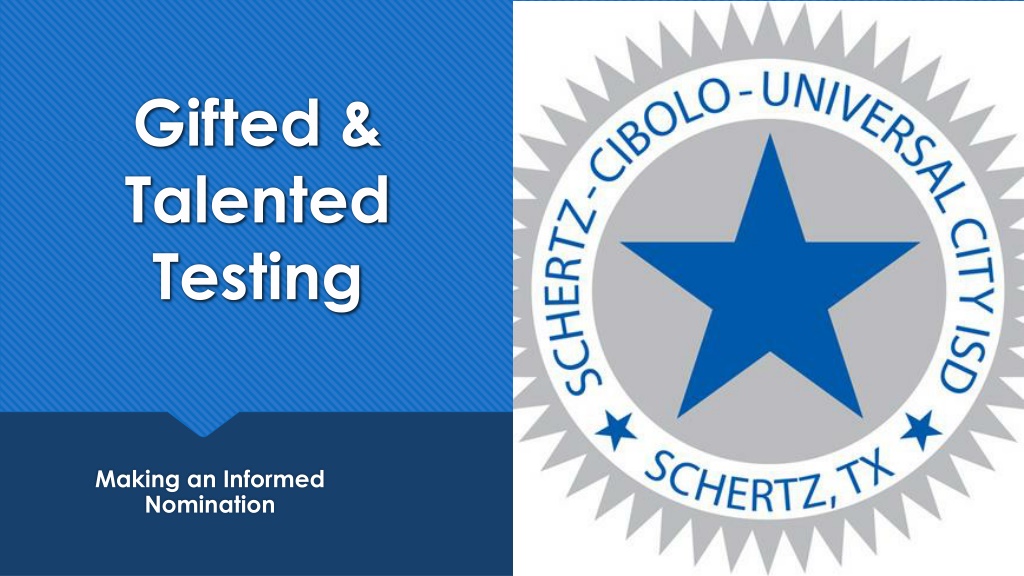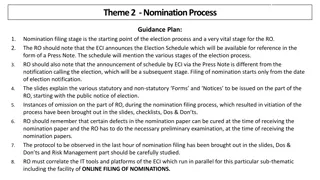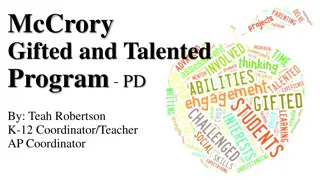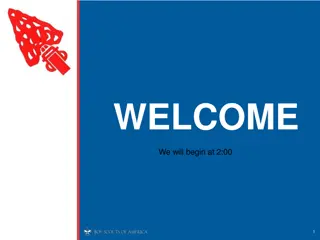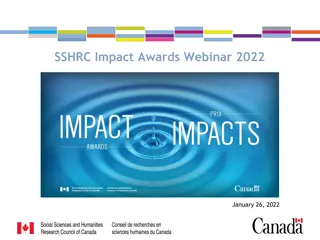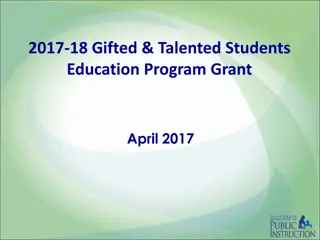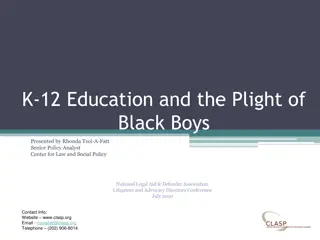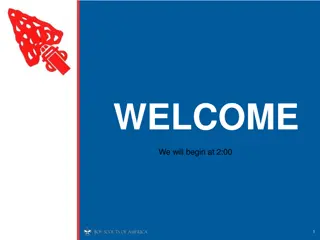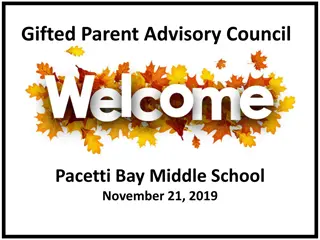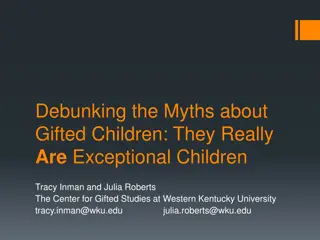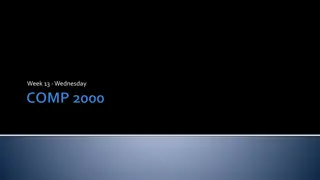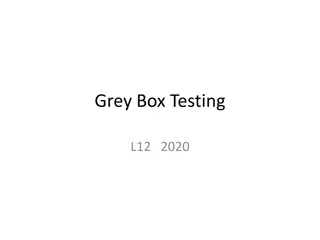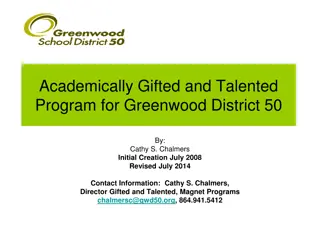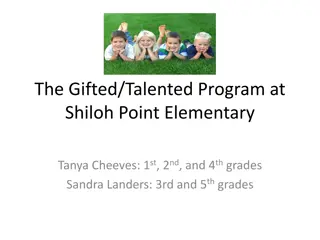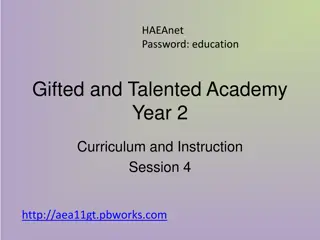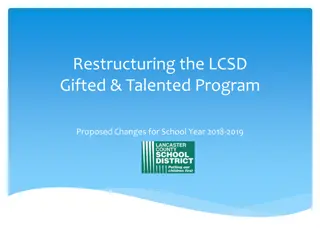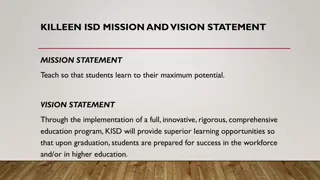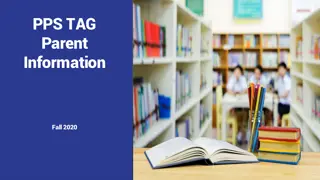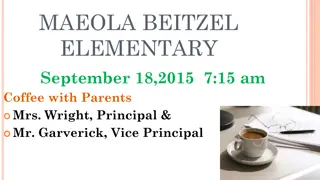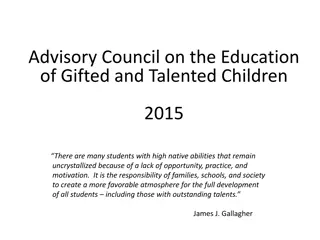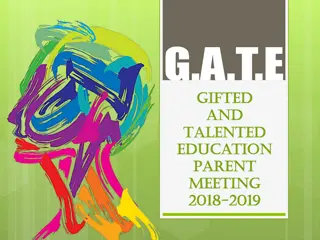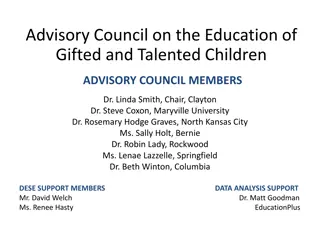Understanding Gifted and Talented Testing and Nomination Process in Education
Gifted and Talented testing is crucial in identifying high-performing students in various academic fields. The process involves screening students yearly, with specific criteria for nomination. The Texas State Plan emphasizes the importance of using multiple measures for appropriate placement in the gifted program, focusing on achievement, aptitude, and qualitative feedback. Recognizing gifted learners is essential in providing them with the support and challenges they need to thrive in their academic pursuits.
Download Presentation

Please find below an Image/Link to download the presentation.
The content on the website is provided AS IS for your information and personal use only. It may not be sold, licensed, or shared on other websites without obtaining consent from the author. Download presentation by click this link. If you encounter any issues during the download, it is possible that the publisher has removed the file from their server.
E N D
Presentation Transcript
Gifted & Talented Testing Making an Informed Nomination
Texas State Plan for the Education of Gifted & Talented Students SCUC ISD, in conjunction with the State Plan, defines gifted as .. .any child or youth in grades K-12 who performs at, or shows the potential for performing at, a remarkably high level of accomplishment when compared to others of the same age, experience, or environment and who (1) Exhibits high performance capability in general intellectual ability; or (2) Excels in one or more specific academic fields: math, science, language arts, and/or social studies
GT Screening at SCUC SCUC screens students once a year in the 2ndsemester. ALL Kindergarten students are screened for GT, no nominations are necessary 1st 11thgraders are nominated by parent or teacher in order to be considered for GT screening
High Achievers Remembers the answers. Is interested. Is attentive. Generates advanced ideas. Works hard to achieve. Answers the questions in detail. Performs at the top of the class. Responds with interest and opinions. Learns with ease. Needs 6 to 8 repetitions to master. Comprehends at a high level. Enjoys the company of age peers. Understands complex, abstract humor. Grasps the meaning. Completes assignments on time. Is receptive. Is accurate and complete. Enjoys school often. Absorbs information. Is a technician with expertise in a field. Memorizes well. Is highly alert and observant. Is pleased with own learning. Gets A s. Is able.
Gifted Learner Poses unforeseen questions. Is curious. Is selectively mentally engaged. Generates complex, abstract ideas. Knows without working hard. Ponders with depth and multiple perspectives. Is beyond the group. Exhibits feelings and opinions from multiple perspectives. Already knows. Needs 1 to 3 repetitions to master. Comprehends in-depth, complex ideas. Prefers the company of intellectual peers. Creates complex, abstract humor. Infers and connects concepts. Initiates projects and extensions of assignments. Is intense. Is original and continually developing. Enjoys self-directed learning. Manipulates information. Is an expert who abstracts beyond the field. Guesses and infers well. Anticipates and relates observations. Is self-critical. May not be motivated by grades. Is intellectual.
Basic Screening Breakdown: What Basic Screening Breakdown: What According to the Texas State Plan for the Education of Gifted/Talented Students, we must use three or more measures to assess appropriate placement in the gifted program. We look at three areas: Quantitative #1: Achievement Quantitative #2: Aptitude/Cognitive Ability Qualitative #1: Feedback on observed behaviors and products We generally use three measures, Achievement: District Universal Screener/Iowa Test of Basic Skills Aptitude: CogAT, NNAT2, Woodcock/Munoz (Spanish) Qualitative collection: KOI, (Renzulli-based) Teacher Qualitative Questionnaire
ACHIEVEMENT: ACHIEVEMENT: Measure used: District Universal Screener (K-8)/Iowa TBS (9-12) Information: Diagnostic test that shows student progress in content areas. This test measures growth in fundamental areas of grade appropriate academic achievement standards. Scoring: Tests are on grade level and are compared nationally with students of a similar grade/age range. Scores do NOT reflect the percentage of correct answers, rather a PERCENTILE, which ranks a student in comparison to grade/age peers. Example: if a student scores a 97 in a category, it doesn t mean they got 97% of the test correct. A 97 shows that the student scored higher than 97% of students in the same grade/age who took the test.
APTITUDE/COGNITIVE: Aptitude: What is the student CAPABLE of learning? These tests measure cognitive ability levels (reasoning and problem solving) and are compared nationally with other students of a similar grade/age range. CogAT scores show us a PERCENTILE, which ranks a student in comparison to grade/age peers. Picture/Verbal Analogies Picture/Verbal Classification Sentence Completion Verbal Number Analogies Number Series Number Puzzles Quantitative Tested Areas of the CogAT Figure Matrices Figure Classification Paper folding Non-Verbal
Testing Windows Grade level Kindergarten Semester 2nd Semester Type Universal Screening Timeline Phase I & II screening through 1/25 Additional Screening: 2/11-2/22 Parent Notification by March 1 Teacher nominations by 12/20 Parent nominations 1/22-2/1 Parent Notification by March 8 No parent or Teacher Nominations necessary Parent & Teacher Nominations 1st 12th Grades 2nd Semester
Nomination Window: January 21st February 1st Nominations should be submitted through the student s campus. Nominations may be paper or electronic as determined by GTCC.
GTCCs: GT Campus Coordinators Cibolo Valley ES Cathey Leach Chellee Olson Christine Huth Lori Peveto Norma England Julie Percevecz Amey Szanto Heidi Shriewer Michelle Price 6th Toni Morin 5th Nancy Hinze 6th Mindy Rice 5th Brandi Bagnall Lauren Rollins Schertz ES Shannon Maryfield Mary Rangel Lori Kolodziejski Tjwanna Maxwell Callie Burchard Heather Thornblom Sandy Braziel Nancy Sides Kelli Arvin 6th Madison Suter 5th Green Valley ES Sippel ES Paschal ES Watts ES Rose Garden ES Wiederstein ES Jordan IS Wilder IS Schlather IS Corbett JHS Clemens HS Dobie JHS Steele HS Amour Wetz Susan Shires
GT Campus Committees Each campus has a committee consisting of GT certified teachers and administrators that review all data from the screening process. Campus Committees make recommendations for gifted service based on the district matrix and preponderance of the screening data. Notification of screening/placement results will be sent home. Campus GTCCs can answer questions regarding placement. Parents whose student is recommended for gifted services will be asked to sign and return a permission slip before services are provided.
FAQs Q: If my student is not recommended for gifted services after being screened, may they be nominated again? A: Yes. However, it is not recommended that you have your child test in consecutive years or over- emphasize acceptance into the gifted program. Q: Is there someone I can talk to if I have questions about my student s scores? A: Yes. Your campus GTCC will be able to review those with you and answer any additional questions. Q: If my student is recommended for the program, will they have to retest every year? A: No. Once your student has been identified for the GT program, they will not have to retest as long as they are in our district. However, if they move into another district, they may be asked to retest if the receiving district uses different testing measures. Q: Where can I find more information about giftedness in children? Texas Association of Gifted and Talented (TAGT) has many parent resources. Texas Education Agency (TEA) provides a link for the Texas State Plan for the Education of Gifted and Talented Students.
GT Program Services ALL SCUC ISD EDUCATORS SERVING GIFTED STUDENTS HAVE RECEIVED 40-HOURS OF FOUNDATION TRAINING IN GIFTED EDUCATION AND PARTICIPATE IN A YEARLY 6-HOUR UPDATE IN GIFTED EDUCATION. Elementary: Students receive differentiated assignments according to academic need as part of classroom instruction. This may include extended or additional assignments that build on the depth and complexity of content or opportunity to develop personal interests using content objectives. Opportunities to work with other GT students is facilitated through campus scheduling. Intermediate: GT students are clustered in core content areas and receive instruction with adjusted complexity, depth, and/or pace. Opportunities to work together on advanced products are facilitated by campus. Junior High: GT students are clustered in core content areas and receive instruction with adjusted complexity, depth, and/or pace, including the opportunity to participate in higher level instructional classrooms such as Pre-AP. Opportunities to work together on advanced products are facilitated by campus. High School: GT students are served through enrollment in a variety of high-level academic offerings, including Advanced Placement, On-RAMPS, Independent Study, and International Baccalaureate programs. GT students have additional opportunity to meet and work with other GT students as facilitated by individual campuses and district field day options.
Please contact your GTCC for any questions specific to your campus. Karen Blevins SCUC GT Coordinator kblevins@scuc.txed.net Marcie Alford SCUC GT Coach malford@scuc.txed.net
